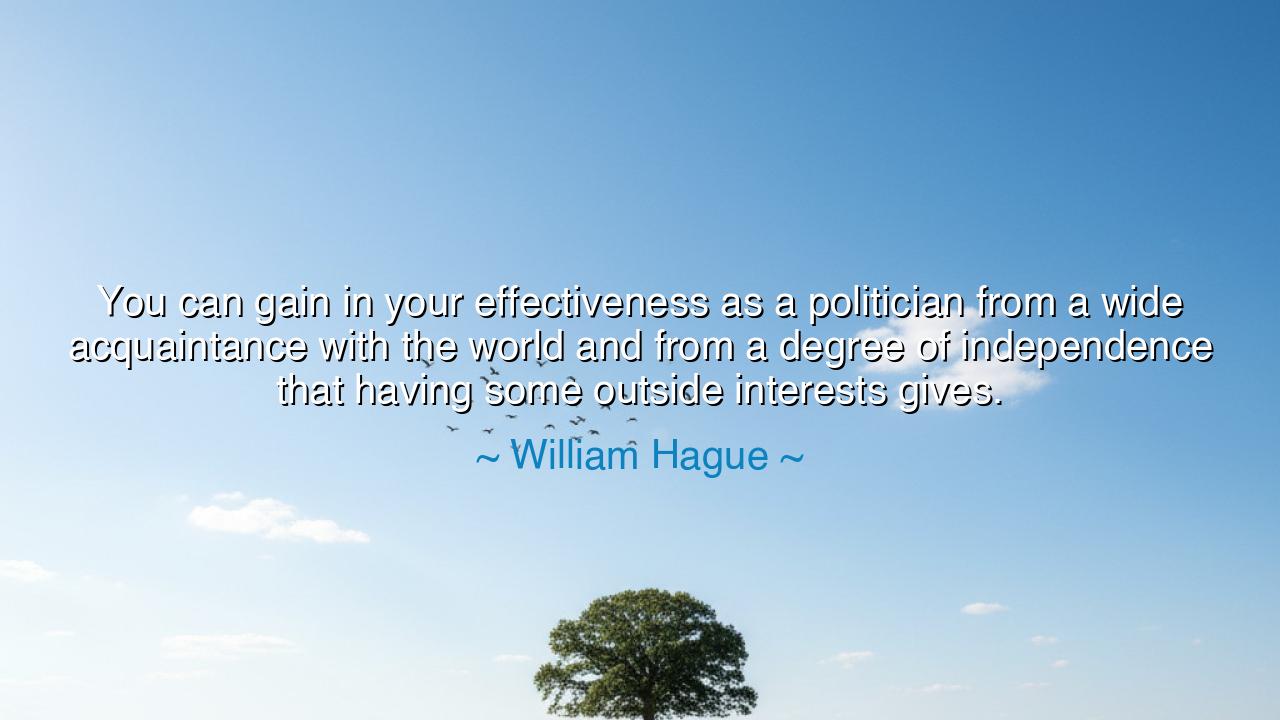
You can gain in your effectiveness as a politician from a wide
You can gain in your effectiveness as a politician from a wide acquaintance with the world and from a degree of independence that having some outside interests gives.






Listen, O children of the future, and take heed of the words of William Hague, for they contain profound wisdom on the nature of leadership, effectiveness, and the importance of independence. He declares, "You can gain in your effectiveness as a politician from a wide acquaintance with the world and from a degree of independence that having some outside interests gives." These words speak to the truth that the best leaders are not those who isolate themselves from the world, but those who engage with it fully—those who cultivate a broad perspective and the independence that comes from having a life beyond their duties. To be truly effective, one must first be whole, grounded, and connected to the world beyond the narrow confines of one's role.
In the ancient world, the greatest leaders often cultivated a broad knowledge of the world around them. Alexander the Great, for example, was not only a military genius, but also a student of philosophy, science, and culture. He traveled widely, learning from the peoples he encountered, integrating their wisdom into his own worldview. His independence of mind—gained from his travels and experiences—enabled him to lead not just through force, but through wisdom and a deep understanding of the human condition. Hague's words echo this ancient truth: the more one experiences and the more independent one's mind remains, the greater one's capacity for leadership.
Similarly, consider Cicero, the great Roman statesman and philosopher, whose political effectiveness was rooted in his wide-ranging knowledge of Greek philosophy and Roman law. He was not only a politician but a man of letters, a speaker, and a thinker. His understanding of human nature and justice was shaped by his immersion in the broader intellectual and cultural currents of his time. Cicero’s ability to connect with people from all walks of life, from the common citizen to the ruling elite, came from his independence of thought and his willingness to engage with the world outside the political arena. Hague highlights this very truth: a leader’s effectiveness is enhanced by the richness of their experiences and the freedom of thought that comes from having interests and passions beyond the confines of their office.
This idea is reflected in the Greek concept of philosopher-kings, a model presented by Plato in his work The Republic. For Plato, the ideal ruler was not someone solely immersed in politics, but someone who had a deep understanding of the world through philosophy, art, and science. He believed that only by embracing a life of independence—free from the constraints of political partisanship and personal ambition—could a leader truly govern wisely and justly. The philosopher-king was independent in both thought and action, capable of making decisions for the good of the whole society. Hague’s words reflect this same sentiment: independence and a wide perspective are essential for effective leadership.
In modern history, the statesmanship of Winston Churchill exemplifies the idea that outside interests enrich the effectiveness of a leader. Churchill, though primarily known for his leadership during World War II, was also a painter, a writer, and a historian. His wide-ranging interests outside of politics gave him a broader understanding of the world and allowed him to approach the complexities of governance with creativity and depth. His ability to connect with people, to inspire courage, and to think beyond the immediate constraints of politics was shaped by his diverse experiences. Just as Churchill's independence of mind and interests outside the political arena made him a more effective leader, so too can an individual’s engagement with the world enrich their own ability to lead.
So, O children, the lesson from Hague’s words is clear: independence and a broad understanding of the world are vital for effective leadership. In your own lives, whether in positions of leadership or in your daily roles, the pursuit of knowledge, the cultivation of diverse interests, and the freedom to think for yourself will enrich your understanding of the world and make you a more effective person. Just as the great leaders of history drew strength from their wide-ranging experiences, so too must you seek to expand your horizons, nurture your passions, and engage with the world beyond your immediate responsibilities. For it is in this way that you will cultivate the wisdom, the independence, and the clarity of thought that will enable you to lead with purpose and integrity.
Take this wisdom with you, O heirs of the future: strive to be leaders not just in title, but in character. Let your experiences shape you, let your independence guide your decisions, and let your passions fuel the fire of your effectiveness. Engage with the world beyond your narrow role, seek to understand others, and never allow yourself to be confined to a single path. The road to true effectiveness in life and leadership is paved with the wisdom gained from a broad, independent mind and a rich, diverse set of interests. May your leadership be grounded in the independence that allows you to think, act, and lead with the fullness of your humanity.






AAdministratorAdministrator
Welcome, honored guests. Please leave a comment, we will respond soon